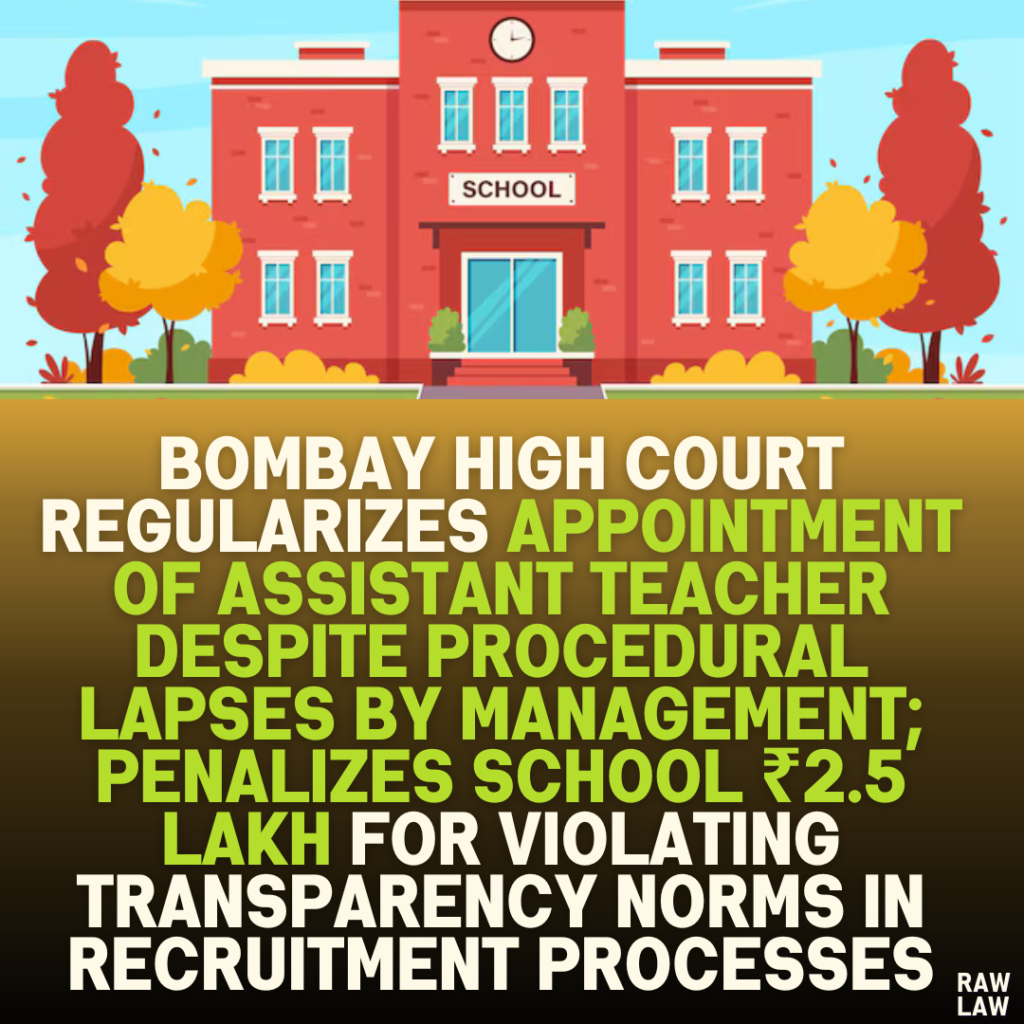Court’s Decision:
The Bombay High Court allowed the petition, quashing the impugned order passed by the Education Officer that rejected the petitioner’s appointment as an Assistant Teacher. The court:
- Directed Respondent No. 2 (Education Officer) to grant approval to the petitioner’s appointment retrospectively from June 15, 2015.
- Ordered verification of the petitioner’s Teacher Eligibility Test (TET) certificate within 30 days.
- Mandated inclusion of the petitioner in the Shalarth system for salary disbursement.
- Imposed a penalty of ₹2,50,000 on the school management for procedural irregularities, to be distributed among welfare organizations.
Facts:
- Appointment:
- The petitioner was appointed as a Shikshan Sevak (Assistant Teacher) on June 15, 2015, by the management of a private aided school under the Maharashtra Employees of Private Schools (MEPS) Rules, 1981.
- The appointment required approval from the Education Officer, which was delayed by six years.
- Rejection of Proposal:
- The Education Officer (Respondent No. 2) rejected the appointment proposal on November 24, 2023, citing:
- Lack of verified TET certification.
- Inadequate recruitment advertisement lacking clarity and publicity.
- Non-availability of a vacant post in the NT category.
- Delay in submitting the proposal for approval.
- The Education Officer (Respondent No. 2) rejected the appointment proposal on November 24, 2023, citing:
- Petition:
- The petitioner filed a writ petition challenging the rejection, arguing that the irregularities were procedural and attributable to the management, not him.
Issues:
- Did the recruitment advertisement meet the transparency and publicity requirements mandated under public employment laws?
- Should the petitioner’s appointment be invalidated due to management lapses in the selection and approval processes?
- What measures should be taken to balance equity and justice in this case?
Petitioner’s Arguments:
- The petitioner was qualified for the post, having passed the TET exam.
- The advertisement was issued for multiple categories, and the petitioner was selected due to non-availability of candidates from other reserved categories.
- Delays in submitting the approval proposal were beyond the petitioner’s control and should not affect the validity of his appointment.
- The rejection of the proposal was arbitrary and against public employment norms.
Respondent’s Arguments:
- The school management’s recruitment advertisement was vague, lacked essential details, and was published in a little-known newspaper with no evidence of wide circulation.
- The management failed to comply with mandatory procedural requirements, including submitting necessary documentation and justifying delays.
- The proposal’s deficiencies and procedural irregularities raised doubts about the fairness of the appointment process.
Analysis of the Law:
- Transparency in Public Employment:
- Article 16 of the Constitution mandates equality of opportunity in public employment.
- Recruitment advertisements must:
- Clearly specify eligibility criteria.
- Ensure wide circulation through reputed and widely read newspapers.
- Avoid ambiguity to attract a fair pool of eligible candidates.
- Legal Precedents:
- Tej Prakash Pathak v. Rajasthan High Court: Emphasized eliminating unfair practices in recruitment.
- State of Orissa v. Mamta Mohanty: Held that vague advertisements and insufficient publicity violate public employment norms.
- State of Bihar v. Upendra Narayan Singh: Criticized “backdoor appointments” that undermine merit-based hiring.
- Irregularities in the Advertisement:
- The advertisement lacked details about post categories and eligibility criteria.
- Its publication in a newspaper of unknown circulation was deemed insufficient to meet transparency norms.
- Such practices were held to deprive eligible candidates of fair opportunities, violating Article 16.
Precedent Analysis:
The Court relied on previous rulings to highlight the importance of fairness in public employment:
- Renu & Ors v. District & Sessions Judge, Tis Hazari Courts:
- Recruitment processes must adhere to transparency norms.
- State of Bihar v. Upendra Narayan Singh:
- Procedural fairness is critical to avoid nepotism and favoritism.
- Excise Superintendent v. Vishweshwara Rao:
- Recruitment should involve wide publicity and fair consideration of all eligible candidates.
Court’s Reasoning:
- Fault of the Management:
- The irregularities in the recruitment process were solely attributable to the school management.
- The petitioner had no role in the lapses, and his qualifications for the post were undisputed.
- Equity and Justice:
- The petitioner had served as an Assistant Teacher for nearly 10 years, during which no objections were raised about his professional competence.
- Terminating the petitioner’s employment would unfairly harm him and his family for the management’s lapses.
- Accountability of the Management:
- To deter future irregularities, the Court imposed a financial penalty on the school management.
Conclusion:
The Court quashed the impugned order and directed:
- Regularization of the petitioner’s appointment from June 15, 2015.
- Verification of the TET certificate within 30 days.
- Inclusion of the petitioner in the Shalarth system for salary processing.
Additionally, the Court penalized the school management ₹2,50,000 for its non-compliance with public employment norms.
Implications:
This judgment highlights:
- The criticality of transparency and fairness in recruitment processes.
- Accountability of managements in adhering to procedural requirements.
- Protection of employees from unjust penalties for organizational lapses.
The ruling reinforces the principle that irregularities in public employment must be addressed without punishing innocent parties, especially long-serving and qualified employees.




Pingback: Supreme Court Sets Aside Bombay High Court’s Bail Order in MCOCA Case; Emphasizes Procedural Adherence and Prohibition of Trial-like Observations - Raw Law